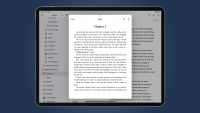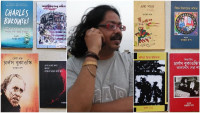
Why I Make Rules for My Writing Students—And Why I Break Them
lithub.com – Wednesday June 8, 2022

The legendary golfer Jack Niklaus has an unorthodox philosophy when it comes to teaching kids how to play the game. Most instructors want to build a young golfer’s swing from the bottom up, drilling them on the fundamentals, but Niklaus recommends letting kids swing as hard as they can. Don’t clutter their minds with rules. Don’t tell them how to grip the club or how to stand. Don’t demand that they keep their front arm straight, their head down. There will be time for all that.
When they’re just starting out, what’s important is that they have fun. Let it rip. They might miss the ball, top it, slice it, hook it, but who cares—they’re learning what works for them. Their muscles are figuring out their own way to swing. They’re developing their own style.
When I started teaching high school English ten years ago, my plan was to be the Jack Niklaus of writing instructors. I’d let my students let it rip. I’d give them the freedom to write what they wanted, in whatever genre they wanted, in whatever form they wanted. Which I did. And which I still do, more or less. I teach an advanced Creative Writing class to seniors, and they can submit prose, poetry, drama—whatever they’re into, we’ll workshop it.
But here’s what happened over the years: my students kept making the same mistakes, using the same broken tools. It was like watching a seven-year-old golfer shank the ball into a pond again and again, scaring all the frogs. The golfer gets frustrated. You get frustrated. The frogs get frustrated.

How to write a novel in Ulysses on iPadOS
techradar.com – Thursday June 2, 2022

Writing a book, whether it’s fiction or fact, is a challenging and daunting task, and it makes sense to use every tool at your disposal to make the job easier.
While traditional word processors have always been a popular choice, we now have apps more tailored to large and complex writing projects, and one of the premier examples is Ulysses.
Ulysses(opens in new tab) is a Markdown(opens in new tab) writing environment, which means you write in plain text, using some simple punctuation to apply styling. The syntax will be familiar to almost anyone who’s written a text message or a tweet; for example, you can surround a phrase with underscores for emphasis, use double-asterisks for boldface, or use hyphens to make a bulleted list. Ulysses also offers controls to apply the styling for you but it's all easy to learn.

Wallace Stegner and the Trap of Using Other People’s Writing
newyorker.com – Thursday June 2, 2022

For years, troubling charges—appropriation, plagiarism—have hovered over Wallace Stegner’s famous novel, “Angle of Repose,” the story of a mining engineer and his wife living in the American West during the late eighteen-hundreds. There’s no question that Stegner used the life of the writer Mary Hallock Foote as the basis for his novel, nor that he used passages of her work without attribution, but at first few people knew it. In 1971, when Stegner’s novel was published, Foote’s memoir was unpublished. When her book came out the following year, Stegner’s novel had won the Pulitzer Prize, and it was protected by a halo of esteem.
But charges began emerging in the late seventies. In 2000, in an introduction to the novel, Jackson Benson, Stegner’s biographer, defended Stegner’s inclusion of thirty-eight passages from Foote’s letters, “approximately 61 pages,” all without attribution. It’s “a brilliant tactic,” Benson says, that creates “an invaluable part of the novel” and provides “depth and authenticity.” As to Foote’s life, Benson says the family had encouraged Stegner to use the material, believing that Stegner would tell the story of Foote’s productive career and happy marriage. In a preface, Stegner wrote, “This is a novel which utilizes selected facts from their real lives. It is in no sense a family history.” But it was recognizably a family history—one that distorted the lives it described. More recently, a persuasive essay by Sands Hall, in the journal Alta, accuses Stegner of plagiarism, the appropriation of Foote’s life, and the slandering of her name. Instead of hewing to the historical facts, Stegner fabricates an adulterous liaison for the character based on Foote, a transgression that costs the life of a child and destroys her marriage. Some people who knew about Foote assumed that’s what happened in her own life, when it did not.

Maggie Shipstead on Dealing with Mistakes in Writing
lithub.com – Sunday May 29, 2022

Maybe five years ago I read a novel in which a man drowns in a lake, and, a few minutes later, his body is found floating on the water’s surface.
If any of my writer friends are reading this, they’re probably groaning because they’ve heard me harp on this example before. What can I say? Sometimes I’m irritating and pedantic. But here’s the thing: it doesn’t make any sense for that body to float. If bodies were inherently buoyant, no one would ever drown. For that scenario to work, the man’s lungs would have filled with water, pulling him under and killing him, and then, almost immediately, something — the condition of death? — would have sent his body rocketing back up to the surface, where, despite being heavier now than before, he floated. No. Bodies float because gases of decomposition eventually lift them. The process takes time: at least a couple days even in relatively warm, shallow water, longer in colder, deeper water. Many bodies never surface at all. But the image of the floating body is pervasive in our culture and our entertainment (“We’ve got a floater,” says one TV cop to another), so familiar that a writer may skip directly from drowning to floating without stopping to think.

The one line that's missing from all the writing advice
bookriot.com – Tuesday May 24, 2022

I started writing as an adult in 2009. I’d scribbled many poems and “novels” as a child and teen, but I had a West Wing-based epiphany in my early 30s (it’s a long story) and started writing seriously then.
Alongside the joy of getting to know my characters and daydreaming a plot into existence, I also read a lot of books on the craft of writing. Studying, I could do. I know school isn’t for everyone, and that I benefit from a lot of white and neurotypical privilege, but I loved school. Looking back now, I think part of what I loved about it was the (mostly) reliable nature of it. I grew up in Belgium in the 1980s, and there was a lot of listening to teachers, making notes neatly in my exercise books, learning things by heart for tests and reciting them at the chalkboard. I was good at following rules, and I liked the fact that a certain kind of input meant a certain kind of mostly predictable output.
I knew, of course, that art is less predictable than that. It was also apparent early on as I started writing that I thought outside the box of what fiction, at least British and American fiction, requires to be considered publishable. But still, if pressed, I would have said that learning my craft and persevering would eventually result in publication. I knew that it might be a long road (five years, maybe!), but if I learned about how to submit to agents, I would eventually find my place in the publishing world.

Little magazines in Instagram era, a tete-a-tete with independent writer Subhankar Das
indiablooms.com – Monday May 23, 2022

Welcome to the world of little magazines, mimeo editors, outlaw poets, chapbooks and experimental writing. IBNS caught up with Subhankar Das, an independent writer, literary activist, poet, blogger, publisher and film producer, to answer some of the questions pertaining to the future of little magazines and small publications in the era of Instagram.
The Little Magazines movement is a world of its own where unknown writers, unpublished poets and unsung litterateurs and activists share their literary exertions and thoughts with well-knit think alike groups spread across the globe.
But how is this child of the mimeograph revolution of the 60s and 70s coping up with the ever-evolving digital universe where the rules of publication and the way we share information have vastly changed. Is digital revolution an existential threat to Little Magazines or will it bring boundless opportunities and unlock limitless creativity?

A Conversation About Music, Memory, and the Topographies of Writing
lithub.com – Saturday May 21, 2022

In November of 2019, just months before COVID hit, I met Mesha Maren in person at the Miami Book Festival, in what would turn out to be my last in-person event for a while. Both of us had debut novels out that year, and a few months prior to that meeting Mesha had interviewed me for the Chicago Review of Books. Having a debut novel when you aren’t friends with many writers or people in publishing can be daunting and lonely if you’re on tour, so I was delighted when Mesha reached out to meet up. While having dinner, I learned that Mesha had written a novel that took place on the border, and I don’t recall whether I shared that I was finishing what would become my story collection Valleyesque.

Agents are feeling the burnout too
thebookseller.com – Tuesday May 17, 2022

Recent reporting on ’industry-wide burnout’ focused on editors, but agents are struggling with equally unsustainable pressures.
When I first started operating as an agent, I remember complaining to a colleague about my lack of work. I sat on their couch, voicing my panic because I had zero list, no emails, no clients and no meetings. I said to them, how anxious it made me to have so much free time when I was building my list and how much I hated not being ferociously busy. And they gave me a pitying look and said gently, that there would come a day very soon when I would regret every single word I had just said.

Kathy Lette: ‘Older women buy most books so why won’t publishers give them what they want?’
inews.co.uk – Sunday May 15, 2022

The author, whose books have sold 573,275 physical copies in the UK since 1998 believes literature is failing to keep up with the phenomenon of women aging disgracefully
Older women are easily the biggest consumers of fiction. So why is it so hard for an internationally best-selling author to get novels about them published?
That’s the conundrum that Kathy Lette says she has faced. The author, who helped invent “chick lit”, has used an interview with i to reveal the hard time she has had getting publishers to accept fiction about menopausal women who are enjoying life.
“I’m struggling to get publishers interested in books that celebrate older women in a positive way,” she says. “They’re saying, ‘I don’t know if there’s a market for this.’
“If you’re not the hot, young new thing, they’re reluctant to think that you have an audience out there. But, of course, it’s older women who buy books.”

Is there a secret to writing a bestselling book?
smh.com.au – Friday May 13, 2022

How do I write thee? Let me count the ways … no, there are too many to count. Every writer has made their own journey, and no two are quite alike. So how can you possibly teach anyone how to write, say, a novel?
Despite the difficulties, there have probably never been so many writing courses and guides on offer, and people eager to take them up. Two of the latest books by Australian writers are perfect illustrations of how different writing advice can be. Both are eminently absorbing, encouraging and inspiring for the novice. In other ways, they are poles apart.
Get the free newsletter | Submit a news item or article | Get Writers' News for your website





